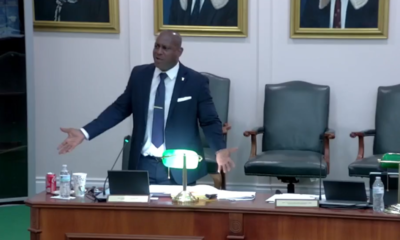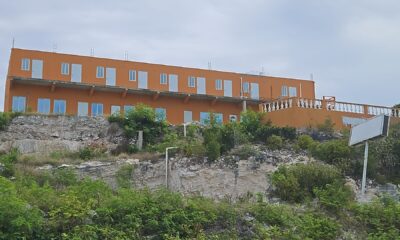By Deandrea Hamilton
Editor
#TurksandCaicos, February 15, 2022 – Edwin Astwood and Robert Been, of the People’s Democratic Movement party had a lot to say when they sat down with Magnetic Media about a number of nationally pressing issues including the level of violent crime, the rising cost of living and plans to raise worker taxes through the National Insurance Board.
As the Opposition party, People’s Democratic Movement continues to get louder on matters, which are irking the general public, the messages are resonating and demonstrating that despite having just one elected seat in the House of Assembly, the PDM intends to bring brawny representation.
Edwin Astwood, the PDM’s Leader and Leader of Opposition business in parliament, said cost of living in Turks and Caicos is simply too high, and raising the minimum wage is not enough of an answer. During the one on one session, February 3, Astwood said bringing up the lowest wage does nothing for those who are not earning minimum wage, so the change needs to come at the border with customs duties.
“Those are the two things that have to be looked at, the duties, our islanders are paying in order to reduce the cost to the suppliers; they will then have to pass that savings on to the consumer, or Government can look at the amount of money that people are making.”
Both men had a lot to say about the spate of crime and how it is being handled. Astwood, who said he was among the panelists at the public meeting held recently by Police in Grand Turk, said he was also on the receiving end of harsh words from a frustrated public.
The party’s leader shared that he and Been have met directly with the Royal TCI Police about crime and crime fighting.
“It was a very helpful, very useful, very detailed and respectful discussion. Ideas were bounced back and forth. He listened to our ideas, what can work, what cannot work, what can be implemented, what cannot be implemented, and we have an idea on the way forward.”
During the interview, which lasted just over an hour, we were reminded about Robert Been’s campaign stance on crime. The Deputy Party Leader of the PDM has advocated for community policing to be enhanced and he put forth an idea to do it, affordably. He still wants to see mobile police stations, and said after their chat with the RTCIPF, the concept seems to be on the way.
“Substation units; which are mobile where you can have a station in an area one minute and the next ten to fifteen minutes it can be in another area. What this does, is it basically deters criminal activities and crime from happening. As leaders we met the assistant commissioner (of Police) on Monday (Jan 31) and we discussed a whole number of topics and again that came up, so Police are looking to invest in the substations.”
Been said communities like Wheeland and Kew Town, the former is one of the furthest flung residential districts; the latter is one of the most crime ridden in the country – would benefit from the pop up police stations.
“It could also be used as a station in the event of a crime, when it is happening. It could be like a headquarters and the whole idea is to bring back the trust within the community.”
Robert Been said it was unconfirmed during their meeting if there would be one or two mobile police stations to start, but the duo felt confident the Police were moving toward the concept in an effort to abate crime.
“As your opposition, we will definitely be putting pressure on this current administration to bring that mobile station to fruition,’ he said.
A youth survey conducted by the Department of Youth Affairs and published in the National Youth Policy revealed that young people are afraid to live in their neighbourhoods. They are fearful of being sexually assaulted and/or robbed.
We asked the PDM about the fear among youths and whether the opposition feels the Police is giving the country its money’s worth in the fight against crime.
Been, one of the youngest candidates to run on the ballot, still considered in the category of youth himself, shared that Police presence is vital.
“We need to get more community and neighbourhood watch programs. It is something which has been missing from neighbourhoods, and while I cannot confirm if it is present now in any neighbourhood, I think it is a solution to help in reducing some of the criminal activities and again working to build back the confidence of the people in Police,” said Been.
Edwin Astwood disagrees with the school of thought which says that national security is the Governor’s job.
“We put the funding there, we direct how we want it to be spent, we don’t have to be involved in the technical issues, we are not asking for that. But it is our responsibility. We as elected officials have the main role to play and we have to start playing our role even more,” said Astwood who also offered that Police need to present its full plan for full funding.
He does not agree with a piecemeal approach to the funding of national security initiatives.
“Instead of just allocating a certain budget to deal with it (issue of fighting crime) just for this year, maybe we need to do it in a one big purchase phase and get all the resources they might need.”
In a recent Budget Supplementary under the current government administration, Royal TCI Police is earmarked to receive over $1 million dollars including $50,000 to support a gun amnesty program.
A vexing issue for islanders is the announcement that in two months, April 2022, the government has approved for the National Insurance Board to raise contribution rates across the board.
While NIB Executives, including its project manager of the now controversial increase – Walter Gardiner, Sr – have been making the media circuit to educate the public on the need for the hike, the PDM recently held a meeting with Rhesa Cartwright, Director and Diandra Mills, Deputy Director on the coming change.
“They gave us two important dates; 2027 when the current contribution rates will not be able to pay the current obligations and 2049, if we have to tap into the reserves, we will completely wipe out the reserves… that’s only 17 years from now,” said Mr. Astwood.
The NIB is running out of time and out of options when it comes to how the public fund will be protected from running out of money.
Edwin Astwood, seems to be learning more about the challenges at the National Insurance Board than he did when he was a minister in the last government. He said the PDM was hesitant on activating the increase because they felt it was too much for people at the time; now, he is briefed about two to three other options not being explored to bring greater fiscal buoyancy.
Two of them are: expand the investment portfolio and stop the fiscal leakage.
“So, you look at either investments, administration cause or the contributions. So, they decide that the best way is to increase the contributions to reach it up to their twelve percent, but we were thinking to gain one other investment. More could be done in investments. Now, there’s $40 million for local investment and I don’t think that is barely touched.”
People are also conning the NIB’s system. Contributors are claiming injury after three years knowing that if supported, this could serve them up regular payments from NIB as still move toward qualifying for the NIB pension after ten years.
This crookery is costing the TCI big money, the PDM leaders exposed.
“Another thing that we gathered that what has been happening, is that even if you have a person who have left the country over nine years you still have some persons paying to reach the ten year. So, it’s all about putting the right policies in place.
“There are loopholes, and these came out of discussions because we were having discussions and asking questions.”
Robert Been said it does not seem likely there will be a change of heart, however.
“Its only time that’s against the whole system so I think (she said) the government didn’t ask for any delays and even if delays were to be considered I don’t think they would extend more than three to six months.”
It boils down to political will and Board approval. The public has expressed deep concern about the 12 per cent increase, which will take on a staggered implementation beginning in April 2022.
“Let NIB invest here. It is a policy decision, it has to come from the policy makers and that is us, that is the government that is in place.”


 Caribbean News7 days ago
Caribbean News7 days ago
 Caribbean News7 days ago
Caribbean News7 days ago
 Caribbean News1 week ago
Caribbean News1 week ago
 Caribbean News1 week ago
Caribbean News1 week ago
 Bahamas News7 days ago
Bahamas News7 days ago
 News7 days ago
News7 days ago
 Bahamas News1 week ago
Bahamas News1 week ago
 News7 days ago
News7 days ago


























